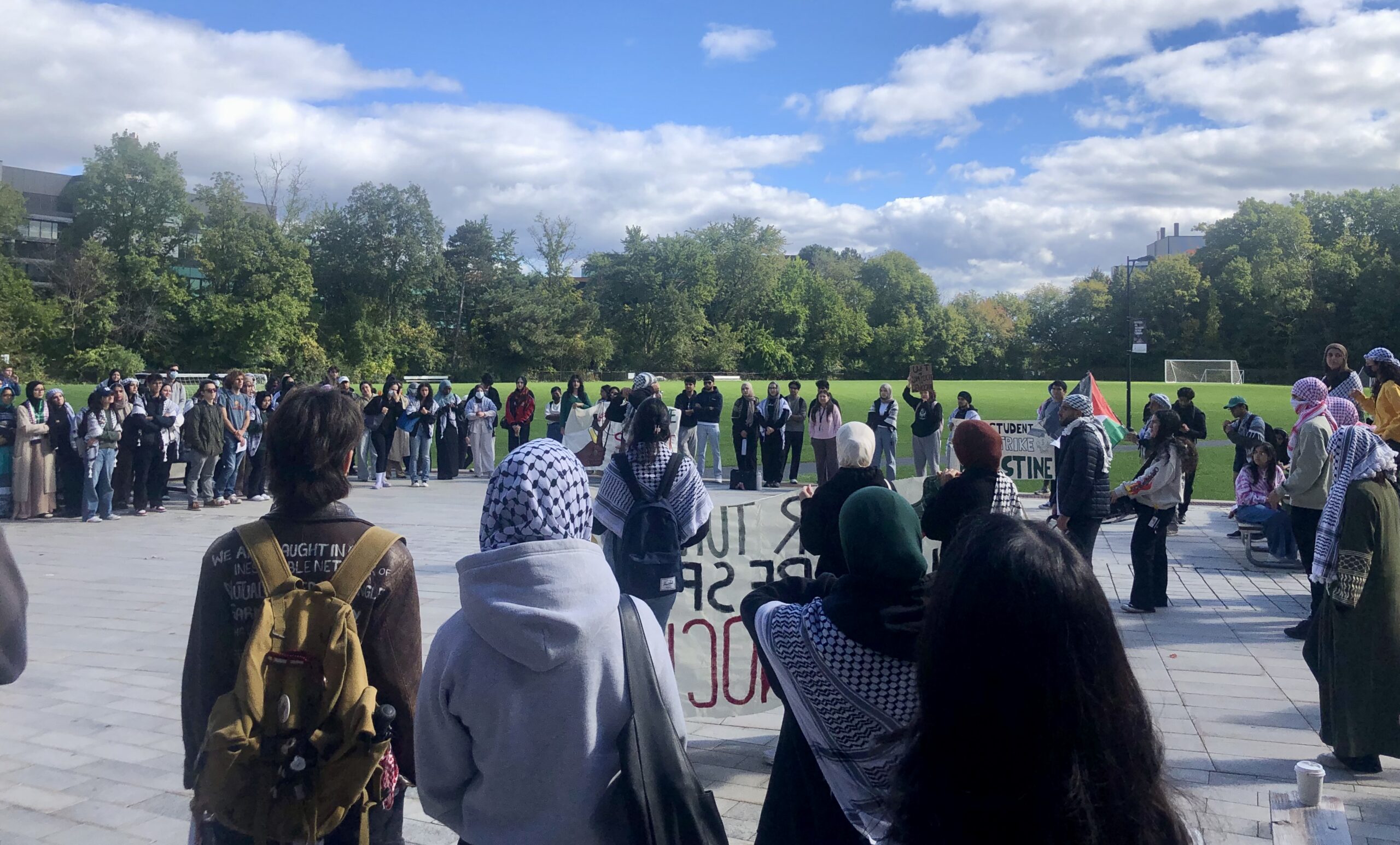“There is only one solution, it’s the student revolution,” UTM students participate in peaceful protest in solidary with Palestinians
UTM students gather in a peaceful protest and walk out in recognition of Palestinian resilience and resistance, joining a global wave of protests to address Western complicity in the Israel-Hamas conflict.
On October 7, students at the University of Toronto Mississauga (UTM) participated in a public walkout on campus to demand action against the university. According to an Instagram post by the UTM Student Union (UTMSU), the walkout was in “protest [of] the University’s complicity amidst escalating attacks and imperial violence by the Israeli government.”
In the same post, UTMSU shared a code of conduct for participants to follow for the peaceful protest. The code of conduct asked participants to respect the rights and opinions of others, bring banners and slogans, gather in a peaceful assembly, stay non-confrontational, cooperate with law enforcement, uphold university values, and report violations of the code if any occur.
The march started at the UTM Student Center and carried on through campus as students chanted slogans accusing the University of Toronto (U of T) of “funding a genocide.” During the march, students condemned the Israel-Hamas war, which took the lives of more than 42,000 people in Palestine, including more than 16,000 children, according to statistics from Al Jazeera.
In collaboration with UTM’s Association of Palestinian Students, UTMSU hosted Keffiyeh week from October 7 to October 11, where students wore Keffiyehs to stand in solidarity with Palestinians.
October 7 marks one year since Hamas-led Palestinian armed groups carried out attacks, including on civilian residential communities, social events and Israeli military bases in the area of southern Israel bordering the Gaza Strip. According to Human Rights Watch, 1,195 people were killed as a result of the attacks. As of October 7 this year, the US Department of State estimated that 101 hostages that were taken last year remain in Gaza, including seven Americans.
Since then, it has been one year since Israel launched a vigorous bombing campaign on Gaza, leaving Palestinians battling genocide while being deprived of necessities, including food and water. Of the lives that were killed, 69 per cent of the victims were children and women.
At the march, students waved Palestinian flags and held cardboard signs with slogans like “drop fees, not bombs,” etched in bright red ink. Students also chanted various phrases, including “no tuition for destruction,” “resistance is justified when people are occupied,” and “from the river to the sea, Palestine will be free, even here at U of T.”
The march went on to the Maanjiwe Nendamowinan and Davis buildings. Outside the Instructional Building, as a crowd of bystanders and onlookers watched attentively, march organizers and speakers delivered speeches on the history of U of T students protesting human rights abuses. They highlighted notable moments of student activism, including resistance to the Vietnam War and opposition to racial and social apartheid in South Africa.
UTMSU President Joelle Salsa was also present at the march and even referenced the unified struggle of all oppressed people while emphasizing imperial violence as the common root of oppression and suffering.
Students at the march also accused the U of T leadership—namely President Meric Gertler and UTM Principal Alexandra Gillespie—of suppressing free speech to “protect Zionism” and deflect criticism of Israel’s genocidal activities. These same concerns were echoed in the Peoples’ Circle for Palestine, a U of T students-led encampment that calls for significant measures toward increasing institutional transparency and financial divestment.
Opinion Editor (Volume 51); Associate Opinion Editor (Volume 50) — Mashiyat (Mash) is a third-year student studying Neuroscience and Professional Writing and Communication (PWC). As this year’s Opinion Editor, Mash hopes to use her writing, editorial, and leadership skills in supporting student journalism in the essential role it plays in fostering intellectual freedom and artistic expression on campuses. When she’s not writing or slaving away at school, Mash uses her free time cooking cultural dishes, striking up conversations with strangers, and being anxious about her nebulous career plans. You can connect with Mash on her LinkedIn.


